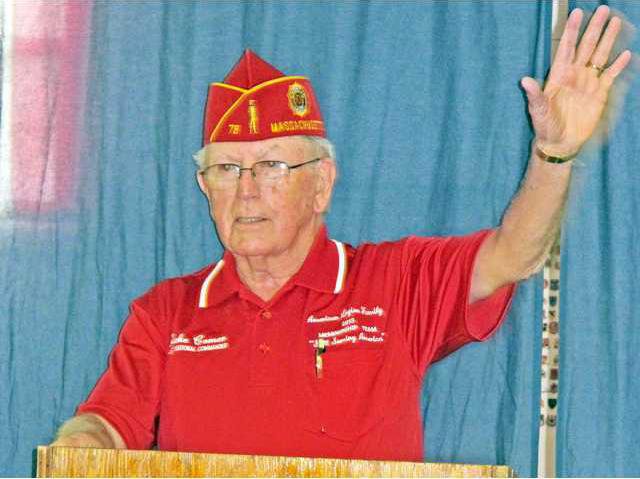Past National American Legion Commander Jake Comer spoke Monday afternoon to state and District 1 American Legion officers at the Hinesville American Legion Post 168. Comer mostly addressed the American Legion’s role in getting the first G.I. Bill through Congress.
Comer served in the Air Force from 1951-55. He was the national commander of the American Legion from 1987-88.
“I know you work very hard, and the ladies of the Auxiliary have worked right by your side,” he said. “If there’s anything you should stress about why veterans should join the (American) Legion, it’s the Legion’s role in making the first G.I. Bill of Rights happen.”
Comer noted that the G.I. Bill, which officially was called the Servicemen’s Readjustment Act of 1944, has a Georgia connection. Then-Georgia Congressman John Gibson broke the tie vote that brought the legislation out of committee to the floor of the U.S. House of Representatives.
Comer said the American Legion and the Jewish Law Veterans were the only veterans organizations originally to support this first-of-its-kind legislation to help war veterans re-adjust to civilian life by providing them with unemployment compensation up to one year as well as a college education, plus home and business loans. A 1969 report by R.B. Pitkin from the American Legion Magazine noted the G.I. Bill was never a “handout” or “charity.” Pitkins said veterans had to earn the benefit by first serving their country, and then work to complete their education program and pay back their loans.
Pitkin’s article said the country as a whole benefited from the homes the veterans bought, the businesses they started and the educations they completed.
Nonetheless, Comer said there was a lot of opposition to the bill, which first was handwritten in December 1943 by past National Commander Harry Colmery at the Mayflower Hotel in Washington, D.C. Colmery and then-current national Commander Warren Atherton were among countless Legion members responsible for writing, promoting and pushing the legislation through both houses of Congress.
Comer said that after the Senate approved the bill in June 1944, the bill sat in a House Military Affairs Committee, held up by a tied vote. Gibson, who was home in Douglas, where he was recovering from illness, had left his proxy vote in Washington with instructions to vote in favor of the G.I. Bill. But the committee refused to accept Gibson’s proxy vote. If Gibson did not return to Washington by 10 a.m. the next day, the bill would fall back to subcommittee and essentially die there.
The Legion and its allies, including publishing giant Randolph Hearst, used “emergency” phone connections through the Atlanta Constitution and Los Angeles Examiner to get Gibson to the phone and then transport him to an Army Air Corps Base in Waycross, then to Jacksonville for a flight that was held up for hours so the congressman could make it to Washington in time to vote. The first G.I. Bill was signed by President Franklin Roosevelt on June 22, 1944.
“Veterans owe it to themselves to belong to the American Legion,” Comer said. “The only thing Congress listens to today is veterans organization.”
Several state and 1st District officers were present for the former commander’s speech, including 1st District Commander George Walker, Georgia Senior Vice Commander Lynne Rollins, 2007-08 Georgia Commander Fae Casper, current Georgia Commander Bill Lienhop, 1st District Senior Vice Commander Greg MacDougal, 2008-09 Georgia Commander Dale Barnett, past Post 168 Commander Frank Scozzafava, Post 168 Commander Chris Mitchell and Post 321 Commander Dennis Fitzgerald.
Ex Legion leader defends GI Bill


Sign up for our e-newsletters